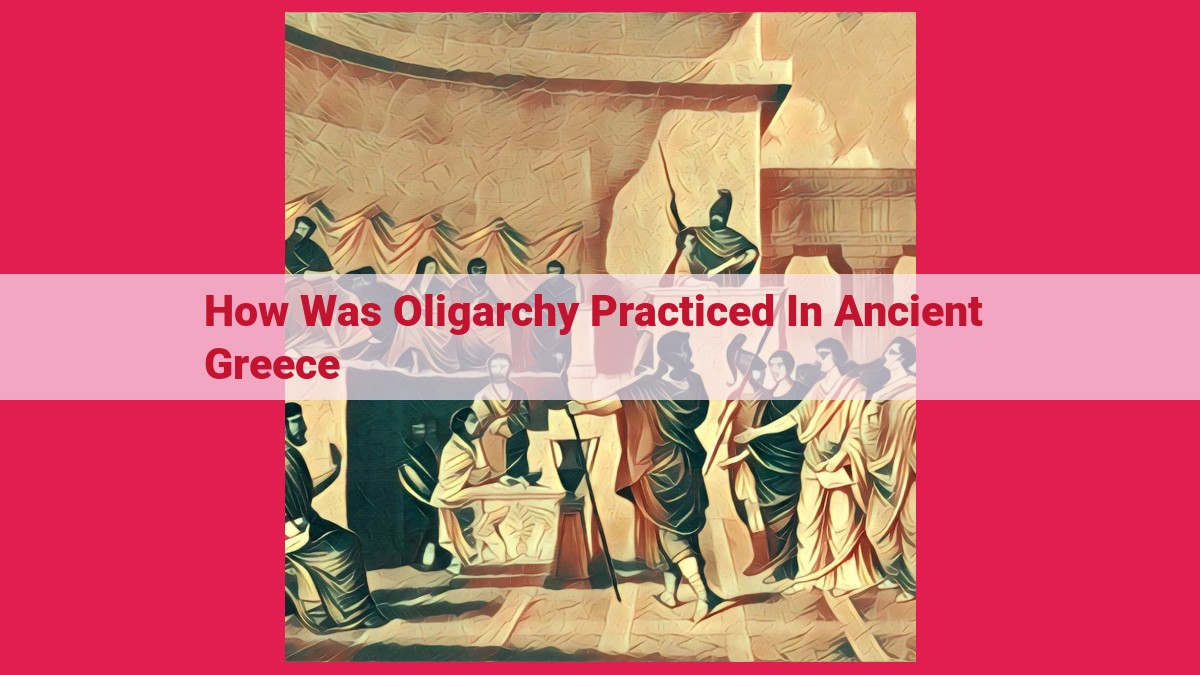Oligarchy In Ancient Greece: Concentration Of Power In An Elite Few

Oligarchy in ancient Greece was a form of government where power was concentrated in the hands of a small elite, typically wealthy landowners and aristocratic families. This ruling class held political office and controlled economic resources, limiting participation and rights for the majority. Oligarchies emphasized civic virtue and landownership as qualifications for leadership, creating social stratification based on wealth and status. They used governing councils, property qualifications, and suppression of opposition to maintain stability and order. However, challenges from tyrants, democrats, and external conflicts often led to the decline of oligarchies and the eventual shift towards more inclusive forms of government.
Oligarchy in Ancient Greece: A Ruling Elite in an Unstable Society
In the tapestry of ancient Greek history, oligarchy emerged as a form of government where power resided in the hands of a few privileged individuals. Oligarchs, often drawn from the ranks of the wealthy, influential, and well-connected, wielded immense political clout, leaving little room for the common citizenry to participate in governance.
This political system took root in an era marked by social and political instability. In the absence of strong central authority, polis (city-states) struggled to maintain order and cohesion. Oligarchies arose as a means to curb chaos and establish a semblance of stability, though their rule was far from egalitarian.
Oligarchies in ancient Greece were characterized by their limited political participation, with only a small fraction of the population eligible to hold office. This exclusivity was often based on wealth, landownership, or social status. The governing bodies, often known as boules (councils), were dominated by these elite few.
Prominent examples of oligarchy can be found in several Greek city-states. In Corinth, a wealthy merchant class held sway, while in Sparta, a warrior elite controlled the political apparatus. Thebes, too, was ruled by a small group of powerful families who maintained their grip on power through strict social stratification and economic control.
The Genesis of Oligarchy in Ancient Greece: A Tale of Social Unrest and Political Turmoil
In the annals of ancient Greece, the rise of oligarchy was an intricate and multifaceted phenomenon that left an enduring mark on society and governance. While the term “oligarchy” often evokes images of wealth and exclusivity, its origins lie in a complex tapestry of social and political upheaval.
Tracing the roots of oligarchy in ancient Greece, we venture into a period characterized by instability and transition. The traditional aristocratic order, based on noble lineage and military prowess, was challenged by a burgeoning class of wealthy landowners and merchants. This emerging elite, eager to assert their influence, found fertile ground in the fragmentation and discord that plagued Greek city-states.
Amidst this social and political flux, oligarchy emerged as a seemingly practical solution. By concentrating power in the hands of a select few individuals, drawn primarily from the upper strata of society, oligarchies sought to restore order and stability to fractious communities. These oligarchs, often wealthy and influential landowners, formed a ruling elite that enshrined their dominance through various mechanisms, including property qualifications for political office.
The oligarchic model, born out of a desire for order amidst chaos, found fertile ground in the competitive political landscape of ancient Greece. Rival factions and competing interests created a ripe environment for oligarchs to assert their influence. By wielding economic and political power, they were able to shape the destiny of their city-states, often to the detriment of the majority population.
Characteristics of Oligarchy:
- Discuss the key features of oligarchic rule, such as limited political participation and rule by elites.
The Defining Characteristics of Oligarchy: A Tale of Elites and Exclusion
Oligarchy, a prevalent form of government in ancient Greece, was characterized by its limited political participation and rule by elites. In this system, power was concentrated in the hands of a small group of wealthy and influential individuals, who controlled the reins of society.
One key feature of oligarchy was its restricted franchise. Unlike democracies, where all citizens had the right to vote and participate in government, oligarchies excluded the vast majority of the population from political decision-making. Only a select few, often based on wealth, landownership, or social status, were eligible to hold office or influence policy.
This elite rule was a defining characteristic of oligarchy. Oligarchs, typically drawn from aristocratic families or merchant classes, wielded significant power and influence. They controlled the political agenda, made laws that favored their interests, and suppressed any dissent or opposition.
Oligarchic rule often justified itself on the grounds of civic virtue and landownership. Oligarchs claimed to possess superior political judgment and moral character, making them best suited to govern. They also emphasized the importance of landownership as a basis for political power, further entrenching their dominance.
This combination of limited political participation and elite rule created a system where only a privileged few had a voice in shaping society. The majority of the population was relegated to the sidelines, with little say in the decisions that affected their lives.
Prominent Examples of Oligarchy in Ancient Greece
Corinth: A Wealthy and Sophisticated Oligarchy
Corinth, a bustling commercial city in the Peloponnese, emerged as a prominent oligarchy. Its ruling elite, known as the Bacchiadae, monopolized political power and amassed vast wealth through trade and commerce. The Bacchiadae controlled the Council of Eight, the city’s governing body, and restricted political participation to a small group of wealthy and influential families.
Sparta: Oligarchy and Military Might
Renowned for its formidable military, Sparta adopted an extreme form of oligarchy. The ruling class, known as the Spartiates, established a rigid social hierarchy based on landownership and military prowess. Political power was concentrated in the Gerousia, an elder’s council that advised the two kings. The Spartiates maintained strict control over the lower classes and enforced a rigorous education system to produce disciplined and loyal soldiers.
Thebes: The Sacred Band
Thebes, a city in central Greece, implemented a more liberal oligarchy. While political power was primarily held by wealthy landowners, the Sacred Band, an elite military unit, played a significant role. Composed of pairs of male lovers, the Sacred Band gained fame for its unwavering loyalty and invincible tactics. Their bravery on the battlefield contributed to Thebes’ military successes and its resistance to Spartan aggression.
These examples illustrate the diverse manifestations of oligarchy in ancient Greece. Each city adapted the model to suit its unique circumstances, creating unique ruling classes and governing structures. Despite their commonalities, these oligarchies differed in their level of stability, social stratification, and political control.
Oligarchic Institutions: Pillars of Elite Rule
In the intricate tapestry of ancient Greek society, oligarchies emerged as systems of governance dominated by a privileged few. To maintain their grip on power, oligarchies meticulously crafted political institutions that ensured their supremacy and excluded the majority from meaningful participation.
At the heart of these institutions lay councils, assemblies composed of elite citizens who wielded considerable authority. These councils deliberated on matters of law, finance, and foreign policy, shaping the direction of the state according to the interests of their narrow ruling class.
Moreover, oligarchies imposed strict property qualifications for holding office. Only those who possessed substantial wealth and landownership were eligible to participate in governance. This economic barrier effectively disenfranchised the majority of the population, ensuring that political power remained within a small, landed aristocracy.
Through these carefully designed institutions, oligarchies created a society sharply divided between the rulers and the ruled. The elite used their political and economic power to maintain civic virtue—a code of conduct that emphasized loyalty to the state and obedience to authority. At the same time, the masses were relegated to a subservient role, their voices largely silenced in the grand scheme of things.
Political Exclusion:
- Explain how oligarchies limited political rights for the majority and emphasized civic virtue and landownership.
Political Exclusion in Ancient Greek Oligarchies
Oligarchies, a form of ancient Greek government, were characterized by limited political participation, with power concentrated in the hands of a select few. This exclusionary system restricted the rights and privileges of the majority of citizens.
Oligarchies emphasized civic virtue, which often meant adhering to traditional values and upholding a certain social order. Landownership was also a key requirement for political participation, with a small group of wealthy landowners dominating decision-making. As a result, many commoners and lower-class citizens were disenfranchised.
This political exclusion had several consequences. It prevented the majority of citizens from having a direct say in how their society was governed. It also created a sense of injustice and resentment among those who were denied a voice. Additionally, it limited the diversity of perspectives in government, as only a narrow segment of society was represented in decision-making.
Social Stratification in Oligarchic Ancient Greece
Oligarchies in ancient Greece were known for their rigid social hierarchy, which divided society into distinct classes based on their wealth, landownership, and status. This stratification served to maintain the power and privilege of the ruling elite and limit opportunities for the rest of the population.
At the top of the social pyramid sat the wealthy landowners, who constituted the oligarchic class. They controlled vast tracts of land, which provided them with immense wealth and influence. They held all the important political and military positions and made all the major decisions that governed society.
Below the oligarchs was a middle class composed of merchants, artisans, and professionals. While they possessed some wealth and status, they were excluded from political power and largely dependent on the goodwill of the ruling elite. They often found themselves caught between the demands of the oligarchs and the grievances of the lower classes.
At the bottom of the social ladder were the common people, who constituted the majority of the population. They were primarily农民 and laborers who owned little or no land. They had no political rights and were subject to the whims of the oligarchs and the middle class.
This social stratification had a profound impact on everyday life in ancient Greece. The oligarchs lived in lavish mansions, enjoyed the best that life had to offer, and held all the social and political power. The middle class aspired to gain the favor of the oligarchs and improve their status, while the lower classes struggled to survive and meet their basic needs.
The social divisions created by oligarchy not only reinforced the power of the ruling elite but also led to tensions and conflicts within society. The lower classes frequently resented their exclusion from power and the unfair distribution of wealth and resources. These tensions could sometimes erupt into violent revolts, which threatened the stability of the oligarchic regime.
Oligarchy in Ancient Greece: Economic Control
In the oligarchic societies of ancient Greece, a small group of elites held a stranglehold on economic power. Their dominance extended over vast tracts of land, lucrative trade routes, and mining operations.
Control of Land:
Oligarchs were the wealthiest landowners, amassing vast estates through conquest, inheritance, and shrewd acquisitions. They used their agricultural wealth to generate income, support their lavish lifestyles, and strengthen their political influence.
Dominance of Trade:
Oligarchs controlled key trade routes, both within Greece and beyond. They exploited strategic port cities to impose duties and taxes on goods passing through, amassing immense fortunes and shoring up their economic power.
Mining Monopoly:
Greece was rich in natural resources, especially precious metals such as silver and gold. Oligarchs often controlled mining operations, extracting wealth from the land and further solidifying their economic dominance.
This economic hegemony enabled oligarchs to manipulate markets, exploit the labor of others, and maintain their social and political control. They manipulated supply and demand to their advantage, enriching themselves at the expense of the general population.
Stability and Order in Oligarchic Greece
Oligarchies in ancient Greece employed a range of tactics to ensure stability and maintain order. These methods often involved the suppression of dissenting voices and the cultivation of unity among the elite ruling class.
Suppression of Opposition
Oligarchies often ruthlessly suppressed any opposition or challenges to their authority. This could include the outlawing of political gatherings, the censorship of critical speech, and the exile or imprisonment of political opponents. By eliminating or silencing dissent, oligarchies aimed to prevent the spread of discontent and maintain their grip on power.
Unity Among Elites
Oligarchic stability also depended on maintaining unity among the ruling elite. Oligarchs typically shared common interests and backgrounds, such as wealth, landownership, and social status. They forged alliances and supported each other politically to protect their privileges and maintain their control. By fostering a sense of cohesion and shared purpose, oligarchies reduced internal divisions that could potentially threaten their rule.
Limited Electoral Participation
Another key mechanism for maintaining order was the restriction of political participation. In oligarchies, only a select group of citizens, such as wealthy landowners or members of specific families, were eligible to hold office or participate in political decision-making. By limiting electoral participation, oligarchies ensured that power remained concentrated in the hands of a few, preventing popular uprisings and challenges from the broader citizenry.
By employing these strategies, oligarchies in ancient Greece were able to maintain stability and order for extended periods. However, these tactics also sowed the seeds of discontent and resentment among the excluded masses, eventually contributing to the decline of oligarchies and the rise of alternative forms of government.
Challenges to Oligarchy:
Oligarchies, despite their efforts to maintain stability and order, faced numerous challenges that threatened their power and authority. These challenges came from both within and outside their societies.
Internal Threats:
-
Tyrants: Ambitious individuals, often wealthy and influential, could emerge within oligarchies and seize power by appealing to the discontented masses. Tyrants promised to break down the oligarchic monopoly on power and restore the people’s rights.
-
Democrats: Supporters of democracy posed a significant threat to oligarchies. They advocated for popular participation in government and the reduction of elite privilege. The rising popularity of democratic ideas challenged the legitimacy of oligarchic rule.
External Threats:
- External Conflicts: Wars and invasions could disrupt the stability of oligarchies. When facing external threats, oligarchs might struggle to maintain their authority and unify their supporters. Defeats in war could weaken their position and open the door to internal challenges.
Other Challenges:
-
Economic Disparity: Oligarchies’ control over economic resources led to significant wealth inequality. This disparity could create resentment among the lower classes and fuel social unrest.
-
Political Exclusion: The exclusion of most citizens from political participation could lead to a lack of political legitimacy and make it difficult for oligarchies to maintain stability and order.
-
Corruption: The concentration of power in the hands of a few individuals could foster corruption and abuse of power. This could undermine public trust and weaken the oligarchy’s authority.
Despite these challenges, oligarchies managed to maintain their dominance in many ancient Greek cities for centuries. They used various strategies to suppress opposition, maintain unity among elites, and adapt to changing circumstances. However, the seeds of their eventual decline were sown in the very challenges they faced.
Decline of Oligarchy:
- Describe the factors that contributed to the decline of oligarchy in ancient Greece and the gradual shift towards democracy or tyranny.
The Impending Fall of Oligarchy: The Seeds of Democracy in Ancient Greece
The once-mighty oligarchies that dominated the political landscape of ancient Greece eventually succumbed to the forces of change, paving the way for the rise of democracy. The decline of these elitist regimes was a gradual process, driven by a complex interplay of internal and external factors.
External Threats: A Catalyst for Change
The incessant wars and conflicts that characterized the Greek world posed a significant challenge to oligarchies. The prolonged Peloponnesian War in particular exposed the weaknesses of the oligarchic system. As external threats escalated, the traditional authority of oligarchs weakened, and the people demanded a more inclusive form of government.
Internal Discord: The Achilles’ Heel of Elites
Oligarchies often bred instability within their ranks, as competing factions vied for power and influence. The wealth and privileges enjoyed by the elite few created resentment among the masses, who felt increasingly excluded from political decision-making. This discontent manifested in rebellions and uprisings, which further eroded the stability of the oligarchic order.
The Rise of Tyrants: A Detour from Democracy
As oligarchies lost legitimacy, ambitious individuals seized the opportunity to establish tyrannies. Tyrants often emerged from the ranks of the disaffected elite or from the aristocracy. By appealing to the masses and promising reform, tyrants were able to overthrow the oligarchs and establish their own brand of authoritarian rule. However, these regimes often proved just as oppressive as the oligarchies they replaced, further fueling the desire for a more just and equitable society.
The Ascendance of Democracy: A New Path to Civic Empowerment
The decline of oligarchy and the failure of tyrannies created a vacuum that was eventually filled by democracy. The idea of a government “of the people, by the people, for the people” gained traction as the ordinary citizens of Greece began to assert their rights. Democratic principles, such as free speech, equal rights, and majority rule, gradually replaced the elitist structures of the past.
In conclusion, the decline of oligarchy in ancient Greece was a complex process driven by external threats, internal discord, the rise of tyrants, and the growing demand for democratic principles. The fall of these elitist regimes paved the way for the emergence of democracy, a system of government that would forever shape the course of Western civilization.





